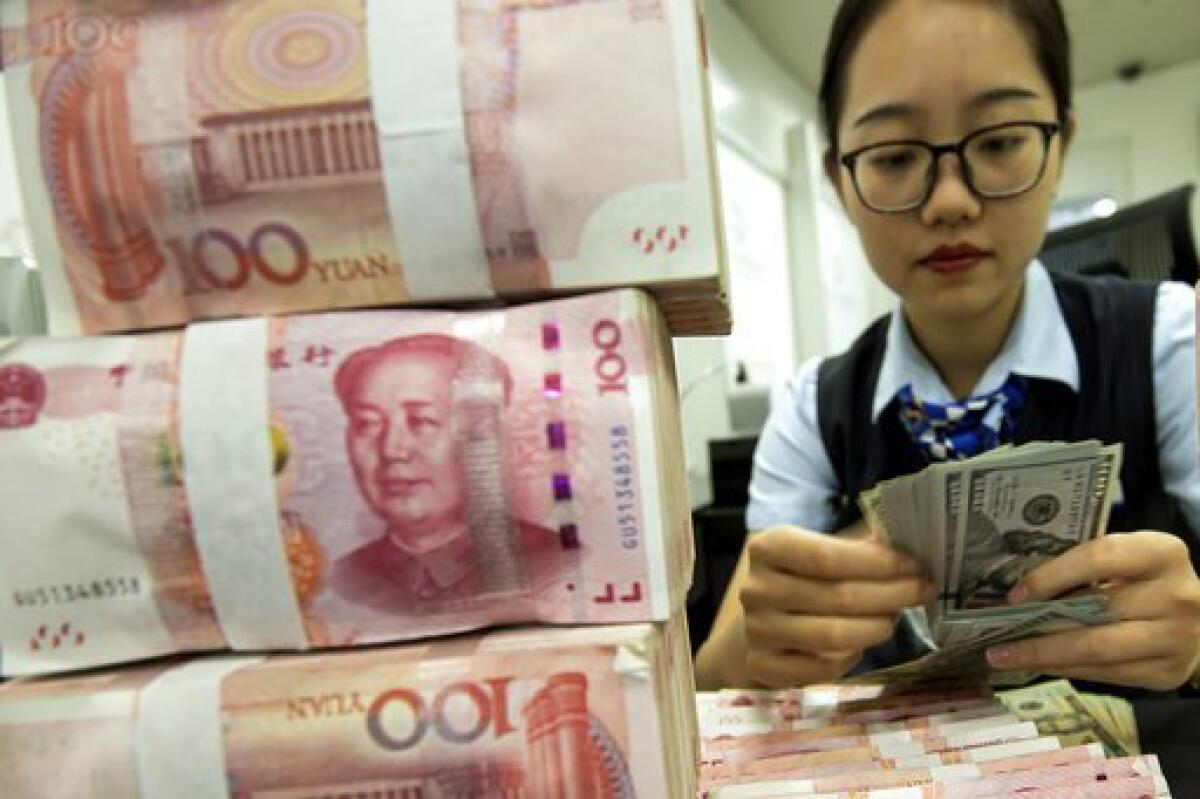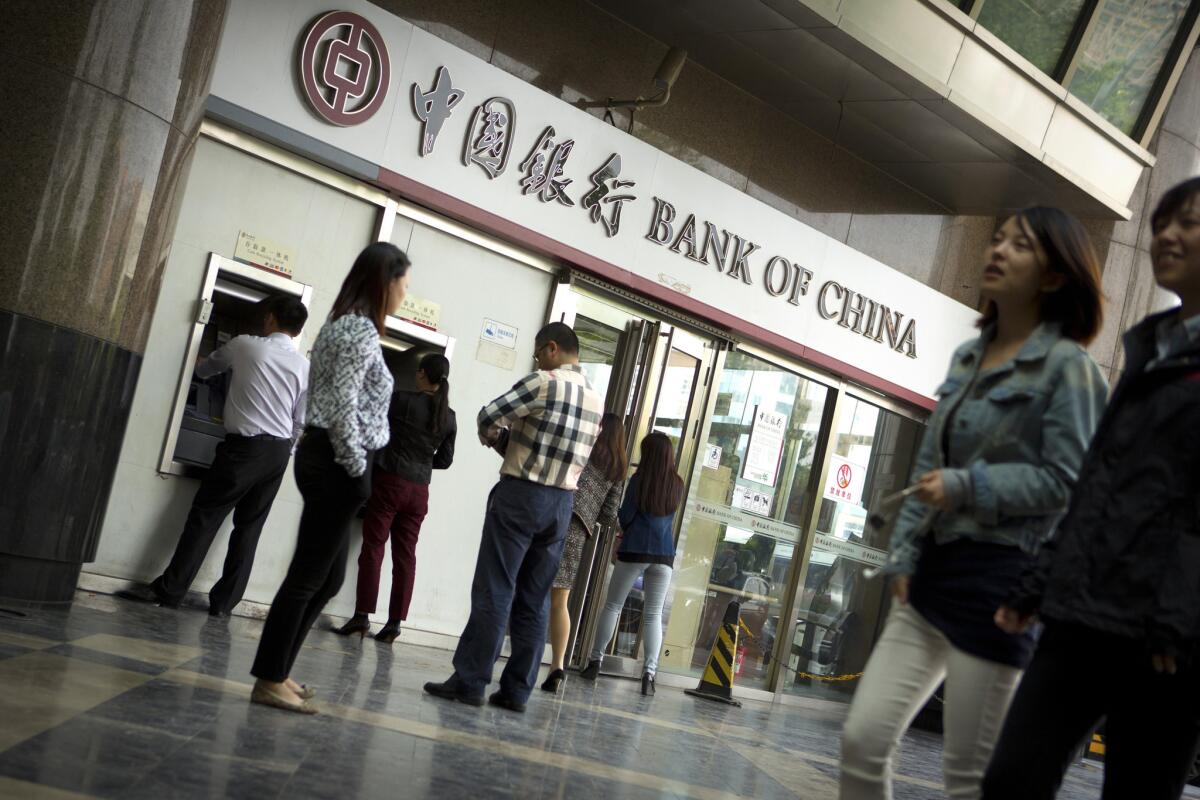Wall Street wants to conquer China. Hereâs what could go wrong

Chinaâs financial opening could be a classic case of be careful what you wish for.
The opportunity of making inroads in the worldâs second-largest economy is prompting the likes of Goldman Sachs Group Inc. and JPMorgan Chase & Co. to detail expansions that some estimate will see $1 trillion plowed into China. Plans to throw open the $45-trillion market were expedited last week after China said it will hasten the entry for securities firms, rating companies and credit-card providers as part of a trade deal with the United States.
The U.S.-China trade deal to be signed Wednesday gives Trump some immediate benefits but allows both sides to put off the most difficult issues.
Yet, a bevy of hurdles still promise to complicate the efforts of U.S. banks and financial services firms. China is home to the worldâs four largest banks by assets, the biggest global fintech company and other formidable competitors. Its tightly controlled system is opaque and arbitrary when it comes to licenses, and the regulation burden is heavy. Recruiting talent has already proved tricky with experienced local executives often preferring state-backed companies.
âItâll be tough for foreign companies to crack the domestic market, owing to how entrenched the incumbents are,â said Nick Marro, the Hong Kong-based global trade lead at the Economist Intelligence Unit.
The market is vast and difficult to navigate. Itâs loaded with more than 130 brokerages, thousands of state-backed lenders, big insurance conglomerates and massive financial technology firms with entrenched customer bases. Industrial and Commercial Bank of China Ltd. â the largest â has more than 600 million retail clients. It and its peers oversee 22 trillion yuan ($3.2 trillion) of wealth management products, making them the nationâs biggest asset managers.
Commercial banking presents a sobering picture. After decades of a limited opening, foreign lenders saw their market share fall to 1.3% in 2017 from 2.4% a decade ago, prompting some to cut branches. Citigroup Inc. had 25 outlets in China as of April last year, down by half from the end of 2015, while HSBC Holdings Plc saw its loss in the China retail banking and wealth management unit widen in 2018 from a year earlier, according to their annual reports.
Wealth managers have hardly fared better. Since an opening three years ago, BlackRock Inc., Man Group Plc and 20 other firms licensed to run private securities funds for high-net-worth individuals manage just 0.2% of Chinaâs 2.5 trillion yuan in hedge fund assets.

Waiting for approvals to do business can be a tortured affair. JPMorgan and Tokyo-based Nomura Holdings Inc. waited more than 10 months for a green light to take majority control of local securities firms. Morgan Stanley is still awaiting a decision on an application submitted in August.
The process is also shrouded in secrecy, and layers of regulation. An application can be rejected without explanation or just left sitting with regulators. Debt rating company Moodyâs last year shelved its plan to take control of Chinaâs largest ratings company amid regulatory inaction, people with knowledge of the matter have said.
The trade deal offers some respite for those struggling through the slow process. China has pledged to review banking licenses on an âexpeditious basis,â accept applications from credit card companies within five working days of submission, review and approve credit raters in 90 days, and treat U.S. asset managers the same as Chinese companies when granting licenses.
âHaving clearer timelines is quite positive, because in the end it boils down to Chinaâs willingness to actually dole out these approvals,â said Marro.
The biggest hurdle could be finding enough qualified people.
Goldman wants to double its staff over five years, and UBS Group AG is in the midst of a similar plan for its investment banking business. Nomura is looking to get to 500 employees in China by 2023 and JPMorgan has signaled itâs adding staff, expanding by a third its office space in Chinaâs tallest skyscraper.
âAll of us are trying to get to 100%, so the race for talent is going to be significant,â said Todd Leland, co-president of Goldmanâs Asia-Pacific operations outside of Japan, in a recent interview. âWhether or not youâre able to compete and compensate people and find the right individuals that are a fit, thatâs by far the biggest challenge.â
Many foreign firms have the option to raise their stake in local joint ventures should Chinese law permit. Still, the price tag could be steep.
Morgan Stanley last year paid nearly 15 times the appraisal value to buy a 2% additional stake in its securities venture from its Chinese partner. JPMorganâs partner ceded control in its asset-management venture at a 33% premium.
The JPMorgan transaction âlooks rather rich,â asset-management research firm Z-Ben Advisors Ltd. said at that time. âGlobal managers should expect the dealâs metrics will be applied to all that follow.â
Capital controls put another damper on the party. While a Chinese official estimates as much as $1 trillion will be plowed into its economy through the financial opening, moving money the other way isnât as easy.
One lawyer in Shanghai cited an example of a major fund that needed almost four months to get approval to repatriate investment proceeds to its headquarters under the Qualified Foreign Institutional Investor program a few years ago, at a time when the yuan was under depreciation pressure.
The strength of global firms also lies in their international networks and ability to allow Chinese companies and households to diversify their investments. That path remains largely shut under current rules.
The measures in the trade deal âstill havenât significantly touched Chinaâs outbound capital flows, which is where the market see greater near-term potential,â said Brock Silvers, a managing director at Adamas Asset Management in Hong Kong.
Constraints on promoting their globally integrated models in China could erode some of the competitive advantage enjoyed by the big-name firms, according to Marro. Restrictions on data could also make it hard in China, with local units forced to operate on different systems than their offshore colleagues, he said.
The dispute between the worldâs two economic powers is far from over despite the Phase One deal. The Trump administration is looking at restrictions on U.S. investments in Chinese companies and financial markets, a possible new front in the trade war.
âThere are many issues and challenges facing the two countries â trade, finance, currency, technology and energy,â said Hubert Tse, a partner at Boss & Young law firm in Shanghai, who has advised global financial institutions on JV negotiations in China since 2003. These âneed to be ironed out going forward,â he said.
More to Read
Inside the business of entertainment
The Wide Shot brings you news, analysis and insights on everything from streaming wars to production â and what it all means for the future.
You may occasionally receive promotional content from the Los Angeles Times.










